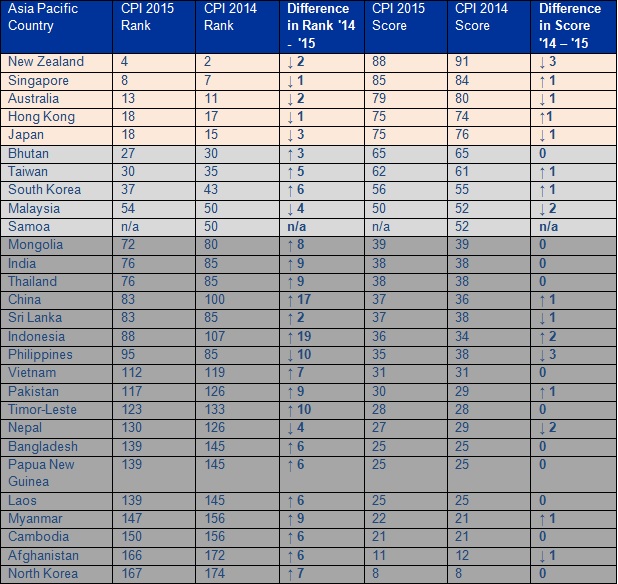with contributing authors Nicola Dresch and Montse Ferrer
The Corruption Perceptions Index (CPI) for 2015, published by Transparency International (TI) on January 27, 2016, shows that globally the scores for more countries improved rather than declined, but the scores for Asia-Pacific remained largely static.
Of the 27 Asia-Pacific countries featured in the CPI 2015, only nine achieved a “passing score” of 50, with the other 18 again scoring below 40. This statistic remains the same as in 2014, indicative of a lack of progress in the region.
The CPI is compiled from expert opinions of public sector corruption, based on reviews of 12 different data sources. The CPI scores countries from 0 to 100, where 0 is perceived to be most corrupt, and 100 is perceived to be least corrupt. Using the scores, TI also ranks the countries from those perceived to be the cleanest (Denmark) to those perceived to be the most corrupt (a tie between North Korea and Somalia).
The CPI for 2015 examines the perception of public sector corruption in 168 countries (compared with 175 in 2014). The lower number of countries included in the 2015 CPI makes trend analysis more complicated. Accordingly, companies operating in the region may find that a country’s score is a more accurate indicator of perceived levels of corruption than its relative rankings.
Major climbers
The major Asia-Pacific climbers in the 2015 CPI ranking include Mongolia (up eight places); India, Myanmar and Thailand (all up nine places); Timor-Leste (up 10 places); China (up 17 places); and Indonesia (up 19 places).
- Indonesia’s remarkable rise (from 107th to 88th place) belies the fact that its score actually only improved by two points (from 34 to 36 points). However, the improvement may be testament to the growing prominence of Indonesia’s independent anti-corruption commission, the KPK, and its forging of links with other international anti-corruption agencies through the Jakarta Statement on Principles for Anti-Corruption Agencies (Jakarta Principles).
- Similarly, China’s ranking rose an equally impressive 17 places (from 100th to 83rd place), although its score improved by only one point (from 36 to 37 points). This rise is nonetheless noteworthy when considered against China’s dramatic fall 20 places in 2014. While the 2014 plunge may have been attributable to increased enforcement activities that revealed the full extent of public sector corruption, the 2015 resurgence indicates that China’s well-publicized anti-corruption campaign is having a positive impact on regional and global perception.
- South Korea’s six-place rise (from 43rd to 37th place) similarly reflects the central government’s efforts to tackle the country’s disparate anti-corruption laws and regulations with the passing of the comprehensive Anti-Corruption and Conflicts of Interest Act, effective in September 2016.
- The unreliable effect of comparing this year’s rankings with 2014 is best illustrated by the apparent fortunes of the countries at the bottom end of the table. For instance, Afghanistan’s score worsened by one point, but it nonetheless rose six places in the ranking (from 172nd to 166th place).
Notable falls
Notable falls this year include the Philippines (down 10 places) and Nepal and Malaysia (each down four places).
- The Philippines’ decline (from 85th to 95th place) may well reflect its disjointed anti-corruption legislative framework, which does not prohibit small-value gifts or facilitation payments and is inconsistently enforced.
- Malaysia’s fall (from 50th place to 54th place) may reflect the impact of the headline-grabbing “1MDB” scandal, in which the Prime Minister Najib Razak has been accused of siphoning money from a state development fund. The Prime Minister’s inability to answer questions about the case, coupled with his lavish lifestyle, has undermined confidence in the leadership’s commitment to anti-corruption, reversing the country’s recent progress up the ranks.
- At the top end of the spectrum, New Zealand and Australia, consistently recognized as two of the least corrupt countries in the world, fell two places (from 2nd to 4th place, and from 11th to 13th place, respectively). Japan suffered an equivalent decline, dropping three places (from 15th to 18th place), tied with Hong Kong (down one place from 2014).
No change
A large number of countries experienced zero change in their scores since 2014. These included Bhutan, Mongolia, India, Thailand, Vietnam, Timor-Leste, Bangladesh, Papua New Guinea, Laos, Cambodia and North Korea, which remained at the foot of the table.
The relatively static performance of some countries this year, such as India and Sri Lanka, may belie the fact that recent governments came to power with very clear anti-corruption agendas and widespread public support for ending corruption. If government commitment to those agendas is genuine and tangible changes are implemented from the top down, their scores should improve in the not-too-distant future.
Conclusion
With the fight against corruption dominating the region’s social, political and economic agendas in recent years, the importance of ensuring that anti-corruption policies, procedures and controls are genuine, effective and properly implemented cannot be overstated. This year’s CPI demonstrates it is not enough to “talk the anti-corruption talk” in the region; all stakeholders need to “walk the anti-corruption walk,” as well.
Full Asia-Pacific Rankings




 Wendy L. Wysong is a partner at
Wendy L. Wysong is a partner at 





